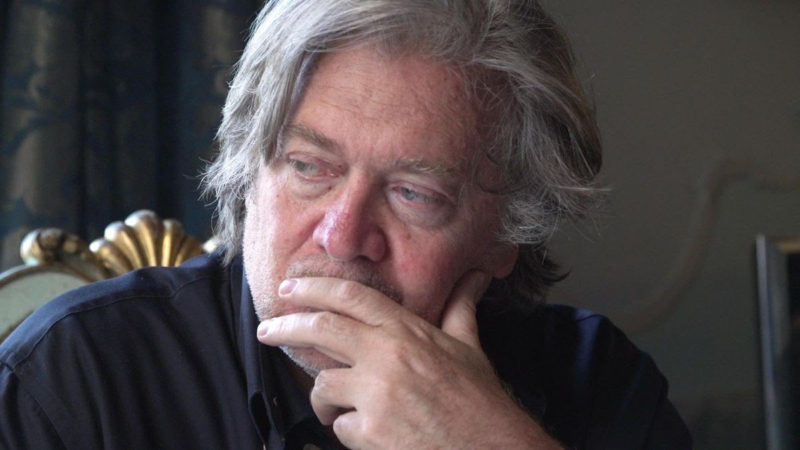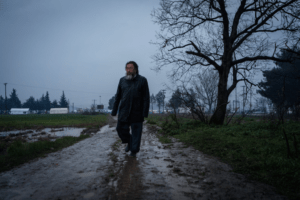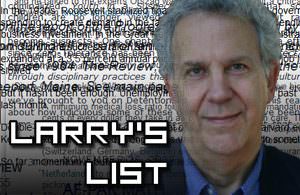‘The Brink’ Lays Bare the Banality of Steve Bannon’s Evil
Filmmaker Alison Klayman documents what she learned about Donald Trump’s former adviser after spending a tumultuous year with him. Steve Bannon gets his close-up in "The Brink." (Magnolia Pictures)
Steve Bannon gets his close-up in "The Brink." (Magnolia Pictures)
At a point early in Alison Klayman’s insightful new documentary, “The Brink,” Steve Bannon gushes over the architectural and organizational planning behind the Bergen-Belsen concentration camp, where 50,000 Jews were exterminated. His emphasis on the planning and details are reflective of what Hannah Arendt termed “the banality of evil,” which could easily be the subtitle of the new film hitting theaters on Friday.
It’s a fly-on-the-wall account of Bannon’s daily life and peripatetic schedule from October 2017—mere weeks after he was fired by Donald Trump—through the November midterm elections. At first glance, we get what we might expect: the shuffling, unkempt figure familiar from news footage. What we don’t expect is the sheer mediocrity of his intellect. Sometimes amusing, sometimes irascible, when unchallenged, Bannon speaks with full-throated brio and a firm grasp of anecdotes and figures (often made up). But the moment he is met with pushback, he obviously and not very credibly resorts to evasion. Still, for someone who was often called Trump’s brain, a thin base of knowledge and a loose grasp of facts might be expected.
“I’ve spent a lot of time listening to him and watching him. He is quite fast to give a combative response, but I think his tactics are often to change the conversation, to distort facts, to lie, to make a joke,” Klayman said in an interview with Truthdig. Klayman was a 2012 Sundance Jury Prize winner for “Ai Weiwei: Never Sorry,” which focused on the world-famous Chinese dissident artist. For “The Brink,” she shot most of the film single-handedly, alone in the room with Bannon and his alt-right peers.
Oddly insecure in various scenes, Bannon worries about people calling him Jabba the Hutt, or about the press noting his lavish hotel stays while doing what he calls “the Lord’s work.” He is surprisingly unctuous with a journalist after a confrontational interview in Venice, where another documentary about him—Errol Morris’ “American Dharma”—was premiering at the city’s celebrated film festival. “Even after Paul Lewis at ‘The Guardian’ goes after him really hard in the interview, he’s going to try to keep everything on this keel of ‘that was fun, right?’ I think he’s fairly easy to win over.”
In “The Brink,” Bannon’s big professional push is two-pronged. First, he’s focused on establishing his 501(c)4, COAR (Citizens of the American Republic), an organization that aims to boost Republican turnout despite Bannon having no formal ties with the party. Second, he’s founding The Movement with the goal of unifying nationalist, mostly racist, organizations across Europe. At an international convention scheduled for January (that didn’t end up taking place), participants were to hammer out a plan for the EU parliamentary election in May that would tip the whole continent to the right.
One of the movie’s most memorable scenes has Bannon meeting in a hotel room with alt-right leaders from throughout the continent. Present are Flemish Parliament member Filip Dewinter, an overt admirer of the SS, along with Sweden’s Kent Ekeroth of the Swedish Democrats, a party rooted in white nationalism, and Italy’s deputy prime minister, Matteo Salvini, of the right-wing populist group Brothers of Italy. They do little more than express frustration, generally holding their tongues in the presence of Klayman’s camera. Then, in later encounters, Bannon denies meeting some of them, brushing questions off with a Trumpian answer: “We were at the same dinner event one time, but I don’t know him.”
“What he’s trying to say is he’s a messenger and he’s trying to shape the narrative according to his ideology,” Klayman said. “It’s part of a legitimization process to make hateful ideas into something that sound more practical and economical.”
Klayman and Bannon bicker in the movie over whether using George Soros’ name in speeches is a dog whistle to anti-Semites. But alt-right commentator (and Bannon’s former Breitbart colleague) Ben Shapiro contends that Bannon isn’t anti-Semitic, telling Slate, “I think Steve’s a very, very power-hungry dude who’s willing to use anybody and anything in order to get ahead. And that includes making common cause with the racist, anti-Semitic alt-right.”
“I don’t think there’s a distinction,” Klayman said, noting that Bannon is considered one of the main architects of Trump’s anti-Muslim travel ban. “I would include pandering to racists in my personal definition of racism. He told me, ‘I don’t believe in structural racism.’ If he’s talking about blacks and Hispanics in the inner city as so horrible and [about] black crime, if he doesn’t think there’s anything structurally that creates that experience, the logical conclusion is that there’s something not right about them. There are many things that if you take what he says and it sounds safe and logical, you really end up in anti-Muslim, anti-immigrant, xenophobic places.”
Producer Marie Therese Guirgis worked as Bannon’s assistant for three years at Wellspring Media, a film distribution company. Once she got permission from him to make a movie, she turned to Klayman, with whom she had worked on the 2018 documentary, “On Her Shoulders.”
“I had never seen him as racist, as anti-Semitic, misogynist,” Guirgis said. “But the film shows what kind of a person he is. The work he is doing is promoting racism. The people he’s working with in Europe, some of them are actual neo-Nazis.”
As Klayman follows Bannon’s crusade to unite the right, a funny thing happens on the way to the revolution—the midterms. Since the crushing defeat of Republicans in the House of Representatives, many alt-right European leaders have spurned The Movement, funding for which Bannon says comes from anonymous European donors.
“I don’t even know if The Movement has a bank account and is a real entity. It seems like a bust,” Klayman said. “The question is, who is funding those projects and who is funding COAR, his (c)4?” Klayman noted that expenditures on European elections must, by law, come from European donors. “He claims he has connections to a lot of nationalists, Dubai, Qatar, [exiled Chinese billionaire] Miles Kwok, a lot of people. And my hope is that investigative reporters follow the money when they see this movie.”
In Rome last weekend to condemn a tentative economic agreement with China, Bannon told Yahoo.com that, following the findings of special counsel Robert Mueller’s report, Trump would “come off the chains,” and that he is “going to go full animal” on his political opponents. He also suggested that Hillary Clinton would be the likely Democratic candidate in 2020, Brexit will end in a no-deal solution, and warned of Chinese hegemony.
“Everything he puts out into the universe has an impact,” says Klayman, who remains concerned about an empowered Bannon. “The fact is, these (alt-right) parties may still have success in the May 2019 elections that he’ll take credit for. And I think that’s a scary prospect.”
Your support matters…Independent journalism is under threat and overshadowed by heavily funded mainstream media.
You can help level the playing field. Become a member.
Your tax-deductible contribution keeps us digging beneath the headlines to give you thought-provoking, investigative reporting and analysis that unearths what's really happening- without compromise.
Give today to support our courageous, independent journalists.






You need to be a supporter to comment.
There are currently no responses to this article.
Be the first to respond.